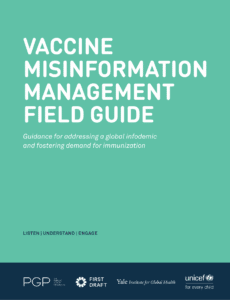Misinformation Alerts
Knowing what misinformation is being shared can help you generate effective messaging.
These insights are based on a combination of automated media monitoring and manual review by public health data analysts. Media data are publicly available data from many sources, such as social media, broadcast television, newspapers and magazines, news websites, online video, blogs, and more. Analysts from the Public Good Projects triangulate this data along with other data from fact checking organizations and investigative sources to provide an accurate, but not exhaustive, list of currently circulating misinformation.
Misinformation Alerts
Knowing what misinformation is being shared can help you generate effective messaging.
These insights are based on a combination of automated media monitoring and manual review by public health data analysts. Media data are publicly available data from many sources, such as social media, broadcast television, newspapers and magazines, news websites, online video, blogs, and more. Analysts from the Public Good Projects triangulate this data along with other data from fact checking organizations and investigative sources to provide an accurate, but not exhaustive, list of currently circulating misinformation.Alerts are categorized as high, medium, and low risk.
- High risk alerts: Narratives with widespread circulation across communities, high engagement, exponential velocity, and a high potential to impact health decisions. Are often more memorable than accurate information.
- Medium risk alerts: Narratives that are circulating in priority populations and pose some threat to health. Potential for further spread due to the tactics used or because of predicted velocity. Often highlights the questions and concerns of people.
- Low risk alerts: Narratives that are limited in reach, don’t impact your community, or lack the qualities necessary for future spread. May indicate information gaps, confusion, or concerns.
A statement from a Supreme Court justice has been trending nationally, particularly among Black and refugee communities. In a dissenting opinion, the justice referenced religious groups that object to COVID-19 vaccines that “were developed using cell lines derived from aborted children.”
Recommendation: The high-profile source of this misinformation elevates its risk. It’s unclear who the “they” is that the congressman is referencing, but both the CDC and the state that they represent regularly update COVID-19 data by vaccination status. As of June 30, unvaccinated Kentuckians are 2.5 times more likely to catch COVID-19 and over 15 times more likely to die from COVID-19 than vaccinated Kentuckians. A booster dose further decreases the risk of COVID-19 infection and death, with boosted Kentuckians making up over a quarter of the population and less than 10 percent of all cases and deaths. As of May, unvaccinated Americans were 3.5 times more likely to be hospitalized with COVID-19 than people who are up to date on their vaccinations. Fact-Checking Source(s): 
During an interview on an American far-right news program, Brazilian President Jair Bolsanaro apologized for deaths that he baselessly claims were caused by the COVID-19 vaccine.
Recommendation: The high-profile source of this misinformation elevates its risk. It is unclear what deaths the president is referring to, as the most widely publicized death after COVID-19 vaccination in Brazil was found to have resulted from an existing autoimmune blood clotting disorder. Messaging may emphasize that far from causing deaths, COVID-19 vaccines dramatically reduced COVID-19 deaths in Brazil. Explaining that billions of people have safely received COVID-19 vaccines is recommended. Fact-Checking Source(s): 
A post falsely claims that Pfizer suspended its vaccine testing in animals because they kept dying. The post was shared over 10,000 times before being marked as misleading on social media.
Recommendation: This myth has been circulating online since the vaccines were authorized. Johnson & Johnson, Moderna, and Pfizer all released data from animal testing and clinical trials in humans. Responding to each piece of misinformation may detract from priority talking points. Fact-checking sources:
An image shared on social media falsely claims that the COVID-19 vaccine mandate is damaging the U.S. military because so many service members have refused to get vaccinated. The post received over 8,700 engagements.
Recommendation: There is no widespread refusal of COVID-19 vaccination in the military. Over 96 percent of active duty service members are vaccinated. Vaccine mandates in the military aren’t new. Service members are required to receive multiple vaccines, including MMR, polio, chickenpox, and tetanus-diphtheria, with some exemptions for religious or health reasons. Fact-checking sources:
A statement from a Supreme Court justice has been trending nationally, particularly among Black and refugee communities. In a dissenting opinion, the justice referenced religious groups that object to COVID-19 vaccines that “were developed using cell lines derived from aborted children.”
Recommendation: Some religious groups have argued that the use of fetal cells in the development of COVID-19 vaccines is grounds for religious exemption from mandates. The cells used to develop the vaccines were collected from fetal tissue in the 1970s and ‘80s and have been replicated thousands of times. These cell lines are among the most widely used in biomedical research and in the development of dozens of common drugs, including most over-the-counter pain, allergy, and cold medications, none of which are opposed by anti-vaccine advocates. Fact-Checking Source(s): 
A post in a large social media group for people who claim to have adverse reactions to COVID-19 vaccines promotes the myth that the vaccines negatively impact fertility. The post questions why vaccinated people are concerned about Roe v. Wade being overturned since they “probably won’t be able to get pregnant.”
Recommendation: There is no evidence that the COVID-19 vaccines will affect fertility or prevent pregnancy. Dozens of participants in the COVID-19 vaccine trial got pregnant during or after the trial with no safety concerns. Several studies have found that COVID-19-vaccinated people have no issue conceiving and do not have any increased risk of adverse pregnancy outcomes. COVID-19 infection increases the risk of pregnancy complications and may temporarily impair male fertility. Fact Checking Source(s): 
A popular figure in the anti-vaccine community best known for saying that a detox bath could remove COVID-19 vaccines from the body claims to have been in a “near fatal” plane crash recently. Some conspiracists are claiming that the crash was an attempt on the individual’s life in response to her opposition to the COVID-19 vaccines. A social media post suggesting that the plane crash was not a coincidence received over 11,000 engagements. The apparent crash appears to match the description of a recent plane crash at Roosevelt Memorial Airport. There is no evidence that any foul play was involved in the crash, which reportedly occurred after the pilot reported engine trouble.
Recommendation: Responding to each piece of misinformation may detract from priority talking points. Fact-checking sources:
A recent study of 37 sperm donors found that the Pfizer COVID-19 vaccine caused a temporary decline in sperm count immediately after vaccination. The study was shared on a social media platform where it received over 17,000 engagements and 1,500 replies in three days. Some responses expressed concern that the study proves the vaccines impair sperm quality or may have a lasting effect on fertility.
Recommendation: Elevated immune activity—particularly fever—in response to vaccination and infection may cause a short-term decline in sperm count. Multiple studies, including the study in question, have found no long-term impact on sperm count or fertility following COVID-19 vaccination. Fact Checking Source(s): 
A video baselessly claims that COVID-19 vaccination reduces breast milk production, resulting in the formula shortage in the U.S. The video was viewed over 17,000 times before it was flagged for containing false information.
Recommendation: One study found that a small percentage of COVID-19 vaccine recipients experienced a brief reduction in breast milk supply immediately after COVID-19 vaccination, but it was fully restored within 72 hours of vaccination. The formula shortage resulted from a plant closure and product recall due to contamination. Fact Checking Source(s): 
A flawed study that is recirculating on social media claims that an increase in emergency calls for cardiovascular events in people under age 40 appears to coincide with the rollout of COVID-19 vaccines in Israel. The study was widely shared on social media when it was first published in April and is once again being shared with the misleading claim that it proves that COVID-19 vaccines cause cardiovascular issues in young adults.
Recommendation: The study doesn’t establish any link between COVID-19 vaccination and cardiovascular issues. In fact, it doesn’t even include data about the patients’ COVID-19 vaccination or infection status, or about any underlying conditions that may make them more susceptible to cardiovascular events. There are also inconsistencies in how the study’s data is interpreted. Emphasizing that heart complications after COVID-19 vaccination are extremely rare is recommended, as is explaining that the benefits of the vaccine greatly outweigh the risks. Fact-Checking Source(s): 
Alerts are categorized as high, medium, and low risk.
- High risk alerts: Narratives with widespread circulation across communities, high engagement, exponential velocity, and a high potential to impact health decisions. Are often more memorable than accurate information.
- Medium risk alerts: Narratives that are circulating in priority populations and pose some threat to health. Potential for further spread due to the tactics used or because of predicted velocity. Often highlights the questions and concerns of people.
- Low risk alerts: Narratives that are limited in reach, don’t impact your community, or lack the qualities necessary for future spread. May indicate information gaps, confusion, or concerns.
Vaccine Misinformation Guide
Get practical tips for addressing misinformation in this new guide. Click image to download, or see highlights.

